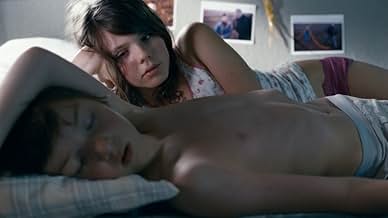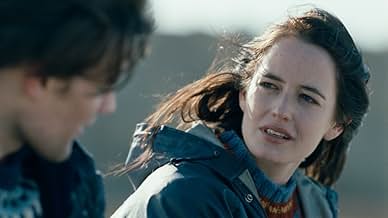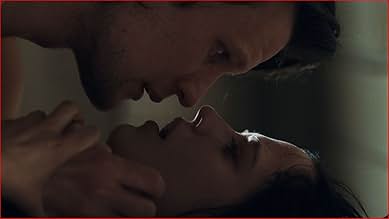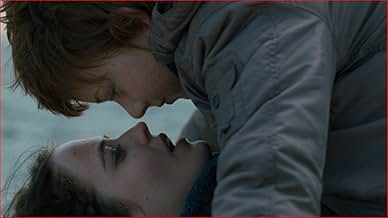NOTE IMDb
6,3/10
16 k
MA NOTE
Ajouter une intrigue dans votre langueA woman's consuming love forces her to bear the clone of her dead beloved. From his infancy to manhood, she faces the unavoidable complexities of her controversial decision.A woman's consuming love forces her to bear the clone of her dead beloved. From his infancy to manhood, she faces the unavoidable complexities of her controversial decision.A woman's consuming love forces her to bear the clone of her dead beloved. From his infancy to manhood, she faces the unavoidable complexities of her controversial decision.
- Récompenses
- 1 victoire et 1 nomination au total
Histoire
Le saviez-vous
- AnecdotesThe theme of this film is closely related to Sigmund Freud's famous theory of the 'Oedipus Complex', which states that there is an unconscious wish for a son to have sex with his mother. He also described the 'Electra Complex' which was the equivalent for females. A similar theme was explored in the 1974 movie 'The Savage is Loose'.
- GaffesIf Tommy's laptop had been in a box for 20 years or so, then he would have to use the plug in the box to get it to work as no battery could keep a charge that long.
- Crédits fousThe ending credits scroll from top to bottom instead of usually bottom to top.
Commentaire à la une
At one point in the film there's a lingering shot of a snail, as if an obvious metaphor that Womb gestates ever so slowly in its story, covering decades of its characters' lives, and does so in such a bleak and loving fashion that it provides you breathing space that sets you thinking in each scene, akin to observing the quietest kid in class who turns out to be the most explosive. If you've read the synopsis by now you'd know this film deals with the issues associated with cloning, and finds kindred spirits with films such as Jonathan Glazer's Birth and especially Mark Romanek's Never Let Me Go.
Hungarian writer-director Benedek Fliegauf tackles his first English language film with Womb, exploring an intense underlying love story that's treated and shot with Zen minimalist principles against the hauntingly beautiful backdrop of Sylt and other equally amazing landscapes in and around Hamburg. Technical strengths in presenting this film cannot be ignored, such as how patiently quiet the narrative is with little dialogue, allow emotions to overwhelm on screen, with sound intricately designed around emotions of frustration, anger and fear. Simply put, this is one journey spanning lifetimes that you'd have to open your heart out to, checking that nagging thought process about the plausibleness of the story at the door, otherwise you'll find yourself deeply muddled given that this in essence is like a science fiction fantasy.
It's a story about attraction, and how inexplicable it can sometimes be, as if of a chemical nature that draws one's attention to another, and how we are thought to be wired up to be attracted to a certain type, profile, or genetic make up, with the latter of course playing a big role in this film since it involves the cloning of a human being, and the existential exploration of whether a clone can ever be the same as its original, or the degree it is so similar. It raises interesting arguments about that of nature versus nurture, since one's personality and values are catalyzed by the growing up process, and while one can be grown from a petri dish, events that shape one's character are external and cannot be controlled, somehow.
But Womb pushes that boundary a little bit further. What if it involves a surrogate mother, won't her 9 months pregnancy in carrying the foetus play a part, and like the film had shown, care had been taken to grow the subject in a fairly controlled environment. Rebecca (Eva Green) and Tommy (Matt Smith) are on the cusp of a budding romantic relationship, where their years apart since young didn't even seem to damper their strong emotions toward each other, only for a sudden road accident to cruelly snatch one away from the other. In what would be a controversial move, Rebecca enrolls to have herself impregnated and becoming the surrogate mother of Tommy's clone, for the selfish belief that in doing so will allow Tommy to live again, much to the disappointment and shock of Tommy's mother, who chose to depart rather than to see a mirror of her lost child in another human being, now brought up by another woman.
It's the ultimate possessive love story, where one can now boast of having being there right from the start of a lover's life, nurturing him from a toddler to a young adult, to the point where one last left off. In most love stories, the feel good factor post tragedy is to discover one expecting the child of a lover now deceased, but in Womb and to a degree of morbidity, it's now the expecting of the lover himself that raises plenty of alarm bells, especially when sexual attraction comes into play, and clearly with the ulterior motive and desire to want to somehow break through strong taboos when opportune, to continue where the lovers last left off. But with Tommy 2 hooking up with a new found girlfriend in Monica (Hannah Murray), with the last act dealing with this three-way relationship, with the audience firmly in the know of how conflicted Rebecca must have felt.
Here's where Eva Green shines in playing a hopeful teenager to a woman who's confused, jealous and probably with a tinge of being jilted, unable to say the truth which she had hidden so well for years. Fans of Dr Who will probably lap at the chance of watching their hero in Matt Smith play the Tommy role, being a youth cut down before his prime, then in his second role as the relatively immature teenager who has yet to know what's in store for him when unexpected events get set in motion.-
So what got the censors here hot and heavy and to charge this with the highest rating possible, outside of an outright ban, is how there's a pervasive feeling of sexual attraction that never goes away, when Tommy 2 starts to appear in Rebecca's life. Granted that a mother naturally shows unconditional love toward her child, this one has a very explicit hint of intent that provokes. Take up the challenge with this unconventional love story, and see if you'd squirm when you get past the amazing visuals to reach its controversial, and to some, shocking, core,
Hungarian writer-director Benedek Fliegauf tackles his first English language film with Womb, exploring an intense underlying love story that's treated and shot with Zen minimalist principles against the hauntingly beautiful backdrop of Sylt and other equally amazing landscapes in and around Hamburg. Technical strengths in presenting this film cannot be ignored, such as how patiently quiet the narrative is with little dialogue, allow emotions to overwhelm on screen, with sound intricately designed around emotions of frustration, anger and fear. Simply put, this is one journey spanning lifetimes that you'd have to open your heart out to, checking that nagging thought process about the plausibleness of the story at the door, otherwise you'll find yourself deeply muddled given that this in essence is like a science fiction fantasy.
It's a story about attraction, and how inexplicable it can sometimes be, as if of a chemical nature that draws one's attention to another, and how we are thought to be wired up to be attracted to a certain type, profile, or genetic make up, with the latter of course playing a big role in this film since it involves the cloning of a human being, and the existential exploration of whether a clone can ever be the same as its original, or the degree it is so similar. It raises interesting arguments about that of nature versus nurture, since one's personality and values are catalyzed by the growing up process, and while one can be grown from a petri dish, events that shape one's character are external and cannot be controlled, somehow.
But Womb pushes that boundary a little bit further. What if it involves a surrogate mother, won't her 9 months pregnancy in carrying the foetus play a part, and like the film had shown, care had been taken to grow the subject in a fairly controlled environment. Rebecca (Eva Green) and Tommy (Matt Smith) are on the cusp of a budding romantic relationship, where their years apart since young didn't even seem to damper their strong emotions toward each other, only for a sudden road accident to cruelly snatch one away from the other. In what would be a controversial move, Rebecca enrolls to have herself impregnated and becoming the surrogate mother of Tommy's clone, for the selfish belief that in doing so will allow Tommy to live again, much to the disappointment and shock of Tommy's mother, who chose to depart rather than to see a mirror of her lost child in another human being, now brought up by another woman.
It's the ultimate possessive love story, where one can now boast of having being there right from the start of a lover's life, nurturing him from a toddler to a young adult, to the point where one last left off. In most love stories, the feel good factor post tragedy is to discover one expecting the child of a lover now deceased, but in Womb and to a degree of morbidity, it's now the expecting of the lover himself that raises plenty of alarm bells, especially when sexual attraction comes into play, and clearly with the ulterior motive and desire to want to somehow break through strong taboos when opportune, to continue where the lovers last left off. But with Tommy 2 hooking up with a new found girlfriend in Monica (Hannah Murray), with the last act dealing with this three-way relationship, with the audience firmly in the know of how conflicted Rebecca must have felt.
Here's where Eva Green shines in playing a hopeful teenager to a woman who's confused, jealous and probably with a tinge of being jilted, unable to say the truth which she had hidden so well for years. Fans of Dr Who will probably lap at the chance of watching their hero in Matt Smith play the Tommy role, being a youth cut down before his prime, then in his second role as the relatively immature teenager who has yet to know what's in store for him when unexpected events get set in motion.-
So what got the censors here hot and heavy and to charge this with the highest rating possible, outside of an outright ban, is how there's a pervasive feeling of sexual attraction that never goes away, when Tommy 2 starts to appear in Rebecca's life. Granted that a mother naturally shows unconditional love toward her child, this one has a very explicit hint of intent that provokes. Take up the challenge with this unconventional love story, and see if you'd squirm when you get past the amazing visuals to reach its controversial, and to some, shocking, core,
- DICK STEEL
- 5 août 2011
- Permalien
Meilleurs choix
Connectez-vous pour évaluer et suivre la liste de favoris afin de recevoir des recommandations personnalisées
Détails
- Date de sortie
- Pays d’origine
- Sites officiels
- Langue
- Aussi connu sous le nom de
- Vientre
- Lieux de tournage
- Sociétés de production
- Voir plus de crédits d'entreprise sur IMDbPro
Box-office
- Budget
- 3 660 000 € (estimé)
- Montant brut mondial
- 36 257 $US
- Durée1 heure 51 minutes
- Couleur
- Mixage
- Rapport de forme
- 2.35 : 1
Contribuer à cette page
Suggérer une modification ou ajouter du contenu manquant































